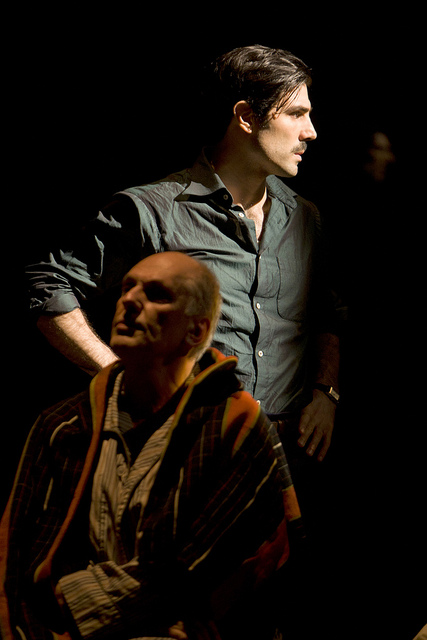
Louis Cancelmi and Michael Cristofer in Evan M. Wiener’s CAPTORS. November 11 through December 11 at the BU Theatre. huntingtontheatre.org. Photo: T. Charles Erickson
Captors by Evan M. Wiener, Huntington Theatre Company, 11/11/11-12/11/11, http://www.huntingtontheatre.org/season/production.aspx?id=10179&src=t.
Reviewed by Craig Idlebrook
(Boston, MA) Writing is as much about what is not said as what is said. A playwright must learn to leave space for the audience to fill in the blanks.
Every writer at some point succumbs to excessive explanation to make sure everyone gets it. This is the flaw of Captors, now playing at the Huntington Theatre. Great set, strong cast, but it watching this play is like sitting down to a meal where someone chews your food for you. By adding too much explanatory dialogue, playwright Evan M. Wiener dissipates the tension of the play’s best scenes.
It is 1960, and a covert team of Israeli intelligence officers in Argentina has captured Adolf Eichmann (Michael Cristofer), a chief architect of the Jewish Holocaust. The team must spirit Eichmann out of the country within a week to stand trial in Israel, but they are under orders not to harm the Nazi war criminal. In fact, they must get his written consent to take him to Israel. The prestige of the young country of Israel is at stake.
The team’s chief interrogator, Hans (Cristopher Burns) is no match for Eichmann’s sharp mind and steel will. Only Malkin (Louis Cancelmi), the team’s strong-man and master of disguise, has built up a rapport with the Nazi. He must use that relationship to convince Eichmann to consent to go to Israel. But he also must wrestle with his own anger and an uneasy feeling of solidarity with the Nazi.
Sounds interesting, right? Except it’s often not really 1960, but 1990, and Malkin is just telling his story to a memoir writer, Cohen (Daniel Eric Gold). The play’s best scenes are deflated when Malkin breaks with Eichmann to hazily debate with Cohen about the unreliability of memory and the fickleness of human nature.
Cancelmi is captivating as Malkin, at least when he is allowed to be a young man of action, rather than an old man weighed down by confusion and introspective dialogue. Cristofer navigates Eichmann well, giving nuance to a character that could tumble quickly into goose-stepping ghoulishness. If the play were reconfigured to include more moments of these two together, the audience would stay on the edge of their seats.
But a third of the stage is devoted to the messy office of the writer, and Gold is given the thankless task of making Cohen interesting, even though his only action is to scribble notes throughout the entire play. Even when Cohen prods Malkin, the dialogue lacks any of the edge between Malkin and Eichmann.
One wonders why director Peter DuBois chose to keep the writer on the stage the entire play. The desk provides the eye with a way out if things get too tense. When Malkin is holding a razor to Eichmann’s throat, I knew I could always look at Cohen chewing on his pencil.
The desk is the only dead-space of a wonderfully twisted and uncomfortable set designed by Beowulf Boritt. Boritt provides the skeletal bits of an Argentinean house and the hint of the Holocaust’s victims, allowing the mind to fill in the blanks with a dread that is deeper than could be created by additional paint and plywood. If only the playwright had adopted the same principle.
